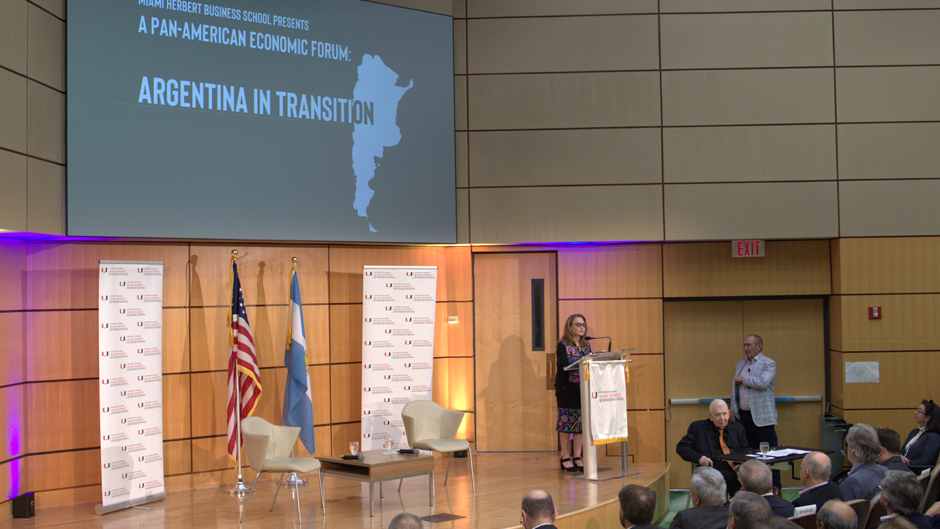As a forum titled “Argentina in Transition” launched last Friday on the Coral Gables Campus, Argentina’s lower house, following days of debate, approved President Javier Milei’s controversial reform package in general terms, albeit requiring significant concessions.
The question of whether the radical reform package can right Argentina’s economy—plagued by seven decades of economic malaise and with inflation currently hovering over 200 percent—was the focus of discussion for panelists. The conference, held at Storer Auditorium in the University of Miami Patti and Allan Herbert Business School, was conducted primarily in Spanish with some English translation.
University of Miami benefactor Allan Herbert, co-organizer and a major contributor to the event, contextualized the forum and the efforts of Milei, elected in December as a political outsider, proponent of smaller government, and libertarian critic of Argentina’s expansive public spending and bulging bureaucracy.
“This important forum that brings together six of the top economists in Latin America seeks to contribute to the good of the region,” said Herbert, who recently earned his doctorate in economics from the school that bears his and his wife’s name.
Felicia Knaul, a professor at the Leonard M. Miller School of Medicine and director of the Institute for Advanced Study of the Americas, welcomed the panelists and emphasized the importance of providing equitable health care access as Argentina’s transition unfolds.
“A greater integration of the private sector opens the door to improvements in the supply of services and new market opportunities,” Knaul said. “In a country where 40 percent of the population is situated below the poverty line, it’s inevitable that there will be some pain. It’s critical to advance prudently and to include mechanisms that guarantee health care access to all.”
Knaul suggested that other countries, such as Canada and Mexico, where University President Julio Frenk, then as Mexico’s minister of health spearheaded the effort to bring affordable care to millions of Mexicans, should serve as models for Argentina’s effort to provide equitable care.
Federico Sturzenegger, professor at Argentina’s private University of San Andrés, an adjunct professor at Harvard University, and an architect of Milei’s pro-business deregulation plan set forth by Milei, was among the panelists. The president of the Central Bank of the Argentine Republic from 2015-2018, he provided an overview of the first 50 days and highlighted the challenges to the structural reform that Milei intends.
“Argentina is an extraordinarily stable country—though not in terms of economics and inflation,” he said. “In many ways, the very same people who have controlled the situation for the last 40 years—the same social and business class, the same actors, the same union leaders, the establishment—are still there today. My conclusion: The corporate state is an enemy that is very difficult to defeat.”
Alejandro Werner, former director of the Western Hemisphere Department of the International Monetary Fund, highlighted Argentina’s troubled dependency on the United Nation’s lending organization, especially in recent years. The country owes some $46 billion, the highest by far of any other country.
“The new president has a very strong commitment to deliver the kind of economic reforms and stabilization policies that the country needs,” Werner said. However, Milei is a total outsider to Argentine politics, his political capital is under construction, and the old political class will be waiting in the wings to deal a deadly blow to this bold attempt at stabilization, reform, and modernization.”
Of three possible scenarios that he foresaw, Werner suggested the most likely would be “middle of the road”—one that succeeds in correcting relative prices, generating positive economic growth but finishing the year with still high inflation.
Other panelists included Fernando Alvarez, Charles F. Grey Distinguished Service Professor in Economics and the College, University of Chicago; Sebastian Galiani, Mancur Olson Professor, Department of Economics, University of Maryland; Martin Uribe, Robert A. Mundell Professor of Economics, Columbia University; and Ivan Werning, Robert M. Solow Professor of Economics, Massachusetts Institute of Technology. Miami Herbert Business School economists Alex Horenstein and Manuel Santos, both Latin American specialists, moderated the forum.
On Feb. 6, the Chamber of Deputies of Argentina will begin an item-by-item review of the massive omnibus reform bill that includes intellectual property, divorce proceedings, and parental access to their children’s school grades, among the issues.
Sturzenegger suggested that much has improved over the first 50-plus days of the new administration, most notably more debate and discourse.
“It’s much healthier. We’ve had a lot more debate over these issues and a wall of silence has fallen. People are hopeful,” he said. The fight to dismantle the corporate state will be similar to that in Australia a few years back, he added.
“There will be some back and forth, some wins, some losses,” he added.

